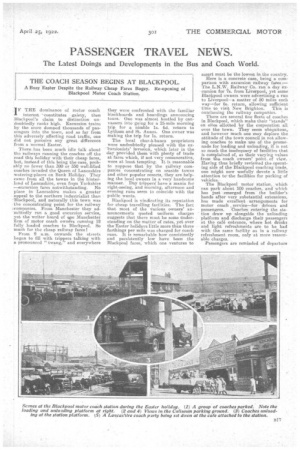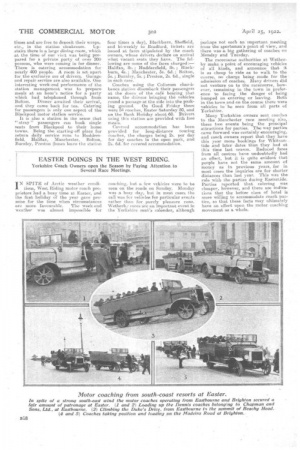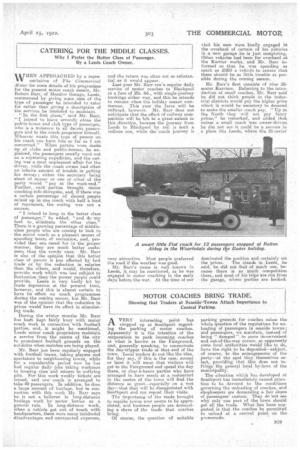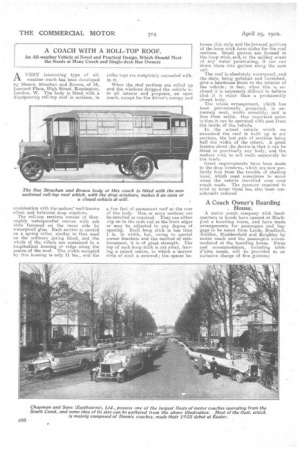PASSENGER TRAVEL NEWS.
Page 21

Page 22

Page 23

Page 24

If you've noticed an error in this article please click here to report it so we can fix it.
The Latest Doings and Developments in the Bus and Coach World.
THE COACH SEASON BEGINS AT BLACKPOOL.
A Busy Easter Despite the Railway Cheap Fares Bogey. Re-opening of Blackpool Motor Coach Station.
I F THE dominance of motor coach interest "'constitutes gaiety, then Blackpool's claim to distinction undoubtedly ranks high. Excursion trains by the score dumped thousands of passengers into the town, and so far from this adversely affecting road traffic, one did not perceive any great difference from a normal Easter. ,
There has been much idle talk about the railways running the coaches off the road this holiday with their cheap fares, but., instead of this being the case, probably no fewer than 300 or 350 well-filled coaches invaded the Queen of Lancashire watering-places on Bank Holiday. They came front all the towns in the hinterland of Lancashire, even from Yorkshire —excursion fares notwithstanding. No place in Lancashire makes a greater appeal to the northern industrialist than -Blackpool, and naturally this town was the concentrating point for the railway :companies. From Manchester they admittedlyran a .good excursion service, yet the writer heard of ape Manchester firm of motor coach owners running 18 fully loaded coaches to Blackpool. So much for the cheap railway fares!
From 9 a.m, onwards the streets began to fill with trippers talking with a pronounced "twang," and everywhere they were confronted with the familiar blackboards and hoardings announcing tours. One was almost hustled by canvassers into going for a 25-mile morning trip for a. nimble is. 6d. return to Lytham and St. Armes. One owner was making the trip fox ls. return.
The local char-a-banes proprietors were undoubtedly pleased with the ex-cursionists' invasion, which later in the day provided them with plenty of trade at fares which, if not very remunerative, were at least tempting. It is reasonable to suppose that by the railway companies concentrating on seaside towns and other popular resorts, they are helping the local owners in a very handsome manner.Day trippers have a mania for sight-seeing, and morning, afternoon and evening runs seem to coincide with the public wants.
Blackpool is vindicating its reputation for cheap travelling facilities. The fact that most of the Various owners' announcements quoted Uniform charges suggests that there must be some understanding on the matter of rates, yet over the Easter holidays little more than three farthings per mile was charged for coach runs, It is remarkable how consistently and persistently low have been the Blackpool fares, which one ventures to
assert must be the lowest in the country.
Here is a concrete case, being a comparison with excursion railway fares :— The L.N.W. Railway Co. ran a day excursion for 7s. from Liverpool, yet some BlaCkpool owners were advertising a run to Liverpool—a matter of 50 Miles each way--for 6s. return, allowing sufficient
time to visit New Brighton. This is outclassing the railway compahies. • There are several fine fleets of coaches in Blackpool, which make their "stands" on sites allotted by the corporation all over the town. They seem ubiquitous, and however much one may deplore the attitude of the town council in not allowing coaches to make use of the promenade for loading and unloading, it. is not so much the inadequacy of facilities that is complained of, as their varying values from the coach owners' point of view. Having thus briefly reviewed the operating side of the Blackpool coaching trade, one might now usefully devote a little attention to the facilities for parking of vehicles.
The Blackpool motor station, which can park about. 100 coaches, and which has just emerged from the builder's hands after very substantial extensions, has made excellent arrangements for motor coach service—for drivers and
passengers. Coaches entering the station draw up alongside the unloading platform and discharge their passengers at the café entrance, where hot drinks and light refreshments are to be had with the same facility as in a railway refreshment room, only at more reasonable charges.
Passengers are reminded of departure
times and are free to deposit their wraps; etc., in the station cloakroom. Lp stairs there is a large dining-room, which at the time of our visit was being prepared for a private .party of over 2() persons, who were coming in for dinner. There is catering accommodation for nearly 400 people. A room is set apart, for the exclusive use of drivers. Garage and repair service are also available. One interesting week-end performance of the station management was to prepare meals at an hour's notice for a party which had telephoned through from Bolton. Dinner awaited their arrival, and they came back for tea. Catering for passengers is only one aspect of the Blackpool motor station service. It is also a station in the sense that " stray " passengers can book single seats from Blackpool to their home towns. Being the starting-off place for return daily service runs to Huddersfield, Halifax, Manchester, Bolton; Burnley, Preston (buses leave the station four times a day), Blackburn, Sheffield, and hi-weekly to Bradford, tickets are issued at, fares stipulated by the coach owners, whose drivers declare on arrival what vacant seats they have. The following are some of the fares charged Halifax, 8s.; Huddersfield, 8s.; Blackburn, 4s.; Manchester, 5s. 6d.; Bolton, 5s. ; Burnley, 5s.; Preston, 2s. 6d., single in each case. Coaches using the Coliseum char-hbanes station disembark their passengers at the doors of the cafe bearing that name, the drivers bringing the vehicles round a passage at the side into the parking ground. On Good Friday there were 54 coaches, Easter Saturday 50, and on the Bank Holiday about 60. Drivers rising this station are provided with free meals. Covered accommodation has been provided for long-distance touring coaches, the charges being 2s. per day for day coaches in the open park, and 2s. 6d for covered accommodation.
EASTER DOINGS IN THE WEST RIDING.
Yorkshire Coach Owners open the Season by Paying Attention. to Several Race Meetings, TN SPITE of Arctic weather condi
tions, West Riding motor coach proprietors had a busy time at Easter, and the first holiday of the year gave pro, anise for the time when circnnustances
are more favourable. The week-end weather was almost impossible for
coaching, but a. few vehicles Were to be seen on the roads on Sunday. Monday was a busy day, but in most cases the call was for vehicles for particular events rather than for purely pleasure rune. Wetherb,, races are an important event in the Yorkshire man's calendar, although perhaps not such an important meeting from the sportsman's point of view, and there was a big gathering of coaches on Monday and Tuesday. The racecourse authorities at Wetherby make a point of enco:uraging vehicles of all hinds, and announce that it is as cheap to ride as to walk to the course, no charge being made for the admission of coaches. Many drivers did not venture on to the racecourse, however, remaining in the town in preference to facing the danger of being humped on entering or leaving. Both in the, town and on the course there were vehicles to be seen from all parts of Yorkshire.
Many Yorkshire owners sent coaches to the Manchester race meeting also, . these two events being the principal attractions for parties. The way parties came forward was certainly encouraging, and coach owners report that they have this year more bookings for Whitsuntide and later dates than they had at this time last season. Reduced fares from all centres have undoubtedly had an effect, but it is quite evident that people have not the same amount of money as in previous years, for in most cases the inquiries are for shorter distances than last year. This was the role with the parties during Eastertide. Parties reported that catering was cheaper, however, and there are indications that the better class of hotel is more willing to accommodate coach parties, so that these facts may ultimately have an effect upon the motor coaching movement as a whole.
CATERING. FOR THE MIDDLE CLASSES.
Why I Prefer the Better Class of Passenger. By a Leeds Coach Owner.
W HEN APPROACHED by a representative of The Commercial Motor for some details of his progranlme for the present motor coach season Mr. Robert Barr, of Meadow Garage, feeds, commenced by giving some idea of the type of passenger he intended to Cater for rather than giving a description of the services he intended to maintain. "Iii the first place," said Mr. Barr, "I intend to leave severely alone the public-house and club type of passenger, who is a nuisance to all decent passengers and to the coach proprietor himself. Whoever wants this type of person on Ills coach can have him so far as I am concerned." When parties were made up at clubs and public-houses, he explained, the passengers usually went out on a roystering eXpedition, and the outing was a most unpleasant affair for the driver, while the coach owner had often an infinite amount of trouble in getting his money ; either the secretary being short of money or one or other of the party would " pay at the week-end." Further, such parties brought motor coach big info disrepute, and, if there was a certain percentage of decent people mixed up in one coach with half a load of royseercrs, the outing was not a success.
"I intend to keep to the better class of passenger," he added, "and do My best to eliminate the other -class. There is a growing percentage of middleclass people who are coming to look to the motor coach as a pleasant means of spending hours of recreation, and, provided they are cared for in the _proper manner, they are much better customers than the rowdy ones. Mr. Barr is also of the opinion that this better class of patron is less affected by bad trade or by the reduction in salaries than the others, and would, therefore, provide work which was lees subject to fluctuation-than the poorer people could provide, Leeds is very badly hit by trade depression at the present time, however, and this is ahnost certain to have its effect on coach programmes during the coming season, but Mr. Barr was of the opinion that the reduction in priee.s would, have its effect in stimulating trade.
During the winter months Mr. Barr has beet kept fairly busy with motor coach work in connection with football parties, and, it might be mentioned, Leeds mOtor coach proprietors maintain a service' from the centre of, the city to prominent football grounds on the outskirts when matches are being played.
Mr. Barr has been regularly engaged with football team-s, taking players and spectators to neighbouring towns, while for a considerable period now he has had regular daily jolas taking workmen to housing sites and miners to outlying pits. For this work weekly tickets are issued, and one coach is arranged to take 40 passengers. In addition, he does a large amount of haulage, but in connection with this work Mr. Barr says he is not a believer in long-distance haulage work by motor lorries as a general -rule. In long-distance work, when a vehicle got out of touch with headquarters, there were many incidental disadvantages and unexpected expenses, and the return was often not so substantial as it would appear.
Last year Mr. Barr ran'a regular daily service of motor coaches to Blackpool at a fare of 25s. 6d., with single-journey bookings either way, and this he intends to resume when the holiday season. commences. This year the fares will be reduced, however. Mr. Barr does not. anticipate that the effect of railway competition will be felt to a great extent in this direction, because the journey from Leeds to Black pool by rail is such a tedious one, while the coach journey is very attractive. Most people preferred the read if the weather was good.
Mr. Barr's name is well known in Leeds, it may be mentioned, as he was engaged in motor coaching in the early days before the war. At the time of our visit his men were busily engaged in the overhaul of certain of his vehicles in a new garage he is just completing. Other vehicles had been for overhaul at the Karrier works, and Mr. Barr informed us that he was spending as much ae E200 a vehicle to ensure that there should be as little trouble as poseible during the coming season.
Mr. Barr's fleet consists of eine 28seater Kerrie's. Referring to the introduction of small reaches, Mr. Barr said he did not think people in the industrial districts would pay the higher price which it would be necessary to demand to make the smaller coach pay. "Up in the North they -wilt not pay fancy prices," he remarked, and added that unless a small coach was owner-driven he diet not see it could be a success in a place like Leeds, where the 28 seater dominated the position and certainly set the prices. The stands in Leeds, he said, he did not find of much use, because there is so much competition there, and most of his trips are run from the garage, where parties are hooked.
MOTOR COACHES BRING TRADE.
Showing that Traders at Seaside-Towns Attach Importance to Central Parking.
ApERY interesting point -bee cropped up at Southport regarding the parking of motor coaches. Apparently it is the intention of the corponation to park incoming coaches at what is known as the Fairground, and, generally speaking, to concentrate the day-tripper trade at that end of the town. Local traders do not like the idea, for they say, if this is the case, sooner or later it will mean that visitors will get to the Fairground and spend the day there, or char a-bancs parties who have arranged to have meals at a restaurant in the centre of the town will find the distance se great—esperially on a wet day—that they will be disappointed with Southport and not repeat their visits.
The importanca of the trade brought to seaside towns now seems to be appreciated, and business people are demanding a share of the trade that coaches bring. Of course, the question of suitable parking grounds for coaches raises the whole question of the regulations for unloading of passengers in seaside towns; and passengers, we maintain, inetead of being " dumped" in some inconvenient and out-of-the-way corner, as apparently some local authorities would like to do, have the right to he deposited—subject, of course, to the arrangements of the party—at the spot they themselves select, providing that this does not infringe the general local by-laws of the municipality.
The situation which has developed at Southport has immediately caused attention to be devoted to the conditions governing the unloading of coaches, and shopkeepers are demanding a fair share of passengers' custom. They do notsee why only one part of the town should get all the trade. What hes been suggested is that the coaches be permitted to unload at a central point on the promenade.
A COACH WITH A ROLL-TOP ROOF.
An All-weather Vehicle of Novel and Practical Design, Which Should Meet the Needs of Many Coach and Single-deck Bus Owners
AVERY interesting type of allweather coach has been developed by Messrs. Strachan and Brown, of 14, Leonard Place, High Street, Kensington, London, W. The body is fitted with a disappearing roll-top roof in sections, in
combination with the makers' well-known silent and balanced drop windows. The roll-top sections consist of thoroughly waterproofed canvas, with ash slats fastened on the .inner side by waterproof glue. Each_ section is carried on a spring roller, similar to that used on the ordinary spring blind, and the whole of the rollers are contained in a longitudinal housing or ridge along the centre of the roof. The width occupied by this housing is only 11 ins., and the roller tops are completely concealed within it.
When the rbof sections are rolled up and the windows dropped the vehicle is, to all intents and purposes, an open coach, except for the driver's canopy and a few feet of permanent roof at the rear of the body. One or more sections can be unrolled as required. They can either clip on to the cant rail at the front edges or may be adjusted to any degree of opening. Each hoop stick is less than 1 in. in width, hut, owing to special corner brackets and the method of reinforcement, it is of great strength. The top of each hoop stick is cut away, leaving a raised centre, to which a narrow strip of steel is screwed ; the spaces be tween this strip and the lowered portions of the hoop stick form slides for the roof sections. Small gutters are formed in the hoop stick, and, in the unlikey event of any water penetrating, it can run down these into gutters along the cant The roof is absolutely waterproof, and the slats, being polished and varnished, give a handsome finish to the interior of the vehicle; in fact, when this is enclosed it is extremely difficult to believe that it is other than a permanently closed body.
The whole arrangement, which has been provisionallyprotected, is extremely neat, wed& smoothly, and is free from rattle.. Oue important point is that it can be operated with ease from the inside of the vehicle.
In the actual vehicle which we examined the roof is built up in six sections, the last pair of sections being half 'the width of the others. A great feature about the device is that it can be fitted to practically any body, and the makers wish to sell roofs separately to" the trade.
Great improvements have been made in the drop windows, which are now perfectly free from the trouble of shaking loose, which used sometimes to occur when the vehicle travelled over very rough roads. The pressure required to raise or lower them has also been considerably reduced
A Coach Owner's Boarding . House.
A motor coach company with headquarters in Leeds have opened at Blackpool a boarding house, and have made arnangements for passengers and luggage to be taken from Leeds, Bradford, Halifax, Huddersfield and Keighley by motor coach and the passengers accommodated at the boarding house. Fares and accommodation, including table d'hôte meals, will be provided at, an inclusive charge of five guineas./






























